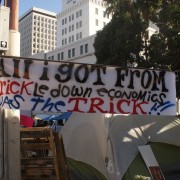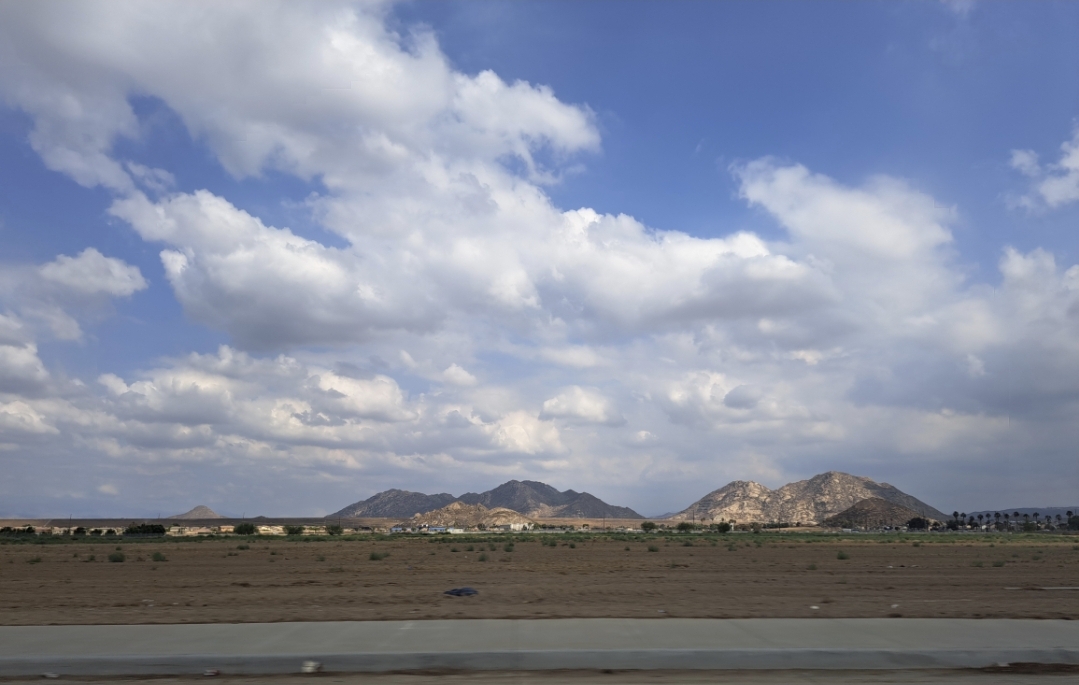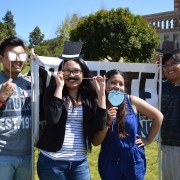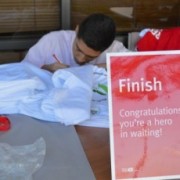Gudiño in Mexico
Roberto Gudiño is on an adventure in Mexico City experiencing El Grito de la Independencia and the ancient pyramids of Teotihuacan. But it is not all tourist attractions for this 2012 UCLA MFA graduate from Department of Film, Television and Digital Media. Roberto is living in Mexico for the next 10 months as part of the COMEXUS/Fulbright-García Robles Fellowship.
Before his trip, Roberto took the time to sit down with La Gente to talk about his UCLA experience and what he hopes to accomplish in the upcoming year.
La Gente: Where did you grow up, and where did you complete your undergrad?
Roberto Gudiño: I grew up in a border town called Douglas, Arizona and I attended the U of A (University of Arizona). I graduated with a degree in film production.
LG: When did you decide to go to graduate school?
RG: Well, I was a part of the McNair achievement program. I got involved with that in my junior year and it’s funny because I didn’t even know what graduate school was before the program. I don’t come from a privileged background and at the time I had just moved to Tucson. My mom sent me a big stack of mail including a brochure from the U of A and what caught my eye was “$3,000 stipend for summer research.” I thought, I don’t know what I need to do but I need those $3,000 dollars. I looked into it and applied. Thank God I got in and it changed my life. When I knew what graduate school was I really wanted it, and it definitely made my life better. I found great mentors there and they guided me for two years to prepare me for graduate school.
LG: Why did you choose UCLA?
RG: One of my mentors, Mary Beth Haralovich, knew Bill McDonald who at the time was the head of cinematography at UCLA. During your second McNair summer you spend the time at the institution where you want to go to graduate school. I approached Bill and he agreed to be my summer mentor, and Cherie Francis who is the head of graduate division of fellowships, set it up so I could be housed here. It was a collaboration between the U of A and UCLA in terms of finding a mentor and having housing, and the Mcnair program was backing me in terms of funding for being out here because I couldn’t afford it, and in preparation of grad school. Once I was here I fell in love with the film program, the campus, my mentor and there was no other school I wanted to go to and it has been probably the best five years my life.
LG: What has made your time at UCLA great?
RG: Well outside the film department, which has been great, another thing that enriched me is being a part of Hermanos Unidos. I would say halfway through my graduate career I felt something was missing. I wasn’t sure what it was but I came to realize that I wanted to speak in Spanish and I wanted to be immersed in my culture. I couldn’t find that in my department because there are not many minorities or Latinos in film production. So I proactively went out looking for opportunities to meet other young Latinos in higher education and I found it with Hermanos. It has been a great two years with them. I started fall of 2011 and the guys who got me in were Jose Valenzuela and Steve Montes. This year I ended up being voted alumni liaison and made a few efforts in getting alumni involved.
LG: What have been some of those efforts?
RG: We were able to get Daniel Gonzalez to come give us our plática. During our meeting we have pláticas that deal with issues that Latinos face and not just male Latinos; HU is very inclusive so we have six lady hermanos and its open to all races. So we have pláticas every meeting once a week, and once a month an alumni will give a plática and some of these issues deal with cultural identity, how to find a career after UCLA, and Latinos in the workplace. We also started a bi-monthly newsletter, which reaches out to alumni and talks about special events that we have.
LG: What are some of the efforts Hermanos make on campus?
RG: We had two hermanos start a new initiative called the Janitor Appreciation dinner. So Hermanos host a dinner for janitors on campus just as a token of appreciation for their efforts of hard work because oftentimes their work is unseen although they are ubiquitous. They are everywhere, but the invisible worker.
LG: Your short film, “The Groundskeeper,” has the same message. Can you discuss how you developed the idea for it?
RG: I shot that my first year as film student here. Just being on campus I kind of felt that you know people wouldn’t necessarily acknowledge some of the maintenance people that would be in the buildings and not necessarily in a condescending way, but they were just invisible workers and didn’t feel the need to engage with them. If you think about it, they are just like you and me. Some of them don’t necessarily work as maintenance people because that is what they wanted for their career. They might have certain limitations either language or education and a lot of those people who work in maintenance might reflect some of our family in terms of skill set. I know my mom doesn’t speak English very well, and she can write it ok. I don’t know if she would feel comfortable being in certain positions. Even writing in English I don’t know if she would feel comfortable doing that, and so my mom has worked as a maintenance person. I think a lot of Hermanos, Hermanas, and other Latinos here on campus and their families have had to do various blue-collar jobs. Even in my hometown my mother worked at a canning factory. A lot of those things you carry around with you unconsciously.
LG: Can you talk about the premise of “The Groundskeeper?”
RG: The movie is about a UCLA maintenance man who has a special connection with a Caucasian professor but the relationship can’t continue because of social norms. So it was kind of speaking to that, speaking to the invisible divide.
LG: Congratulations on being selected as a Fulbright Scholar. What type of work will you be doing in Mexico City?
RG: I am very blessed to have gotten it and very grateful to Jozen Gibson who is my Fulbright adviser here at UCLA. I am very grateful to the people who helped me. Jozen, Cherie, the graduate writing center, my recommendation letter writers, and Ronald Bend, an alum who helps people write their personal statements. A lot of people are behind this and I’m very blessed to be going. I’ll be working with an organization called Jóvenes en Acción sponsored by the U.S. Department of State and the Secretaría de Educación Pública (The Secretariat of Public Education) of the Mexican Government, and another group at the Universidad Latinoamericana (Latinamerican University) and they work with disadvantaged youth in Mexico City. I’ll be teaching film production workshops and the intent is to teach disadvantaged youth film production in terms of camera and lighting. On multiple levels, one is to help them find their voice and two, is to potentially help them find a career path in film production, for example as electricians and gapers. In terms of youth it’s kind of open, some are out of high school but there will be middle school and high school students. We will help give them access to tools. I am going to have my own cameras and lights and potentially writing scripts together informed by our experiences together by stories they might have. They can be co-written or I can write them but a big thing in terms of production is to collaborate with colleagues from UCLA if my film production colleagues come to Mexico to help shoot some shorts it can form a cultural bridge between the US and Mexico, specifically students at UCLA and students in Mexico. I have been able to express my own voice and that will be part of my mission in Mexico City is to help youth discover their own voices and see that there is a platform for them to express themselves and help them develop. I also hope to learn from them.
Roberto would like to share his experience with La Gente readers. He will be releasing a video log every week or two of his time in Mexico. You can check out the video blog and more of his work including the short film “The Groundskeeper” at his website, robertogudino.com.
You can also email Roberto at [email protected]











Leave a Reply
Want to join the discussion?Feel free to contribute!